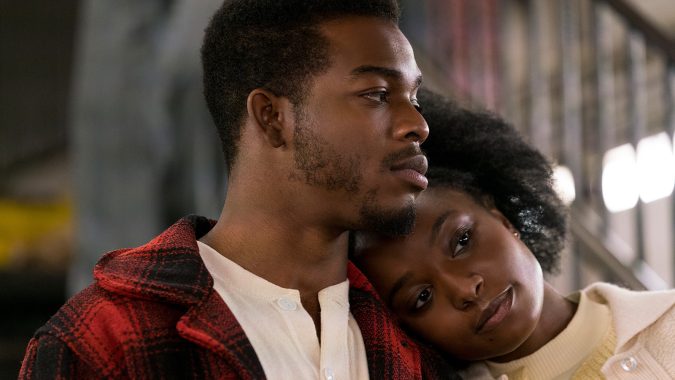At the heart of If Beale Street Could Talk is an accusation of sexual assault. Victoria Rogers (Emily Rios) has identified Alonzo “Fonny” Hunt (Stephan James) as her attacker and quickly turns his life on its head. Gone is his bright future with the love of his life, the young Tish (KiKi Layne), and his calling as an artist. Instead he’s locked away. Despite knowing he’s innocent (he was with Tish and another friend during the alleged attack, not that the police cared for such an alibi) he’s aware he’ll spend months if not years away from his now-pregnant girlfriend.
Set in early-1970s New York City, the film is an adaptation of a 1974 James Baldwin novel directed by Moonlight director Barry Jenkins. The story of Fonny and Tish is written as both a celebration of black love and an indictment of the racism black men and women experience as part of their everyday life. The drama alternates between showing us how these two young neighbors first fell in love in sun-dappled dewy scenes and how they’re faring once Fonny is locked up, in starker and darker scenes that still glow with the promise of justice. The key to getting him out, it turns out, is Victoria. The Puerto Rican woman is the sole witness who has come forward and as Tish and her lawyer eventually find out, she was likely pressured by the cops to identify Fonny as her attacker.
There’s a version of Beale Street that could easily have made Victoria into the villain of the piece. It’s a version that could have hinged on a hysterical woman’s false allegations designed to merely bring down an innocent young man. In 2018, and in a post-#MeToo world, such a narrative would’ve felt tone-deaf at best and insidious at worst. Thankfully, rather than discredit Victoria and paint her as some sort of lying accuser, the film goes out of its way to believe her story. All the women trying to help get Fonny out — which include Tish, her sister Ernestine (Teyonah Parris) and their mother Sharon (Regina King) — quickly understand that Victoria’s accusation may be misguided but that it doesn’t invalidate her experience. In conversations between themselves they agree that she probably was assaulted and that her testimony against Fonny was driven less by the conviction that it was him than by pressure from the cops.
By the time the movie catches up with Victoria in Puerto Rico, where Tish’s mother urges her to reconsider her testimony, it’s clear she’s just as broken and as much of a victim of an unfair system as Fonny. Clearly troubled by what happened to her and the broken life she led in New York, Victoria as played by Rios is a woman slowly unraveling. She’s unkempt and struggles to have a conversation with Sharon. Yet the film extends its empathetic lens on her in a way that it never does to the other key person involved in Fonny’s arrest: the white cop who knocked on his apartment’s door to take him into the station.

Played by Ed Skrein, Officer Bell is arguably the only character that Beale Street treats with contempt. In close-ups we see him sneering; it’s obvious the drama wants us to think of him as a crooked cop who framed Fonny. In response, it turns out, for Fonny not showing enough respect to a white police officer during an altercation when the young black man had punched a guy who was harassing Tish. “Bell’s eyes swept over Fonny’s black body with the unanswerable cruelty of lust,” Baldwin writes in his novel, “as though he had lit the blow-torch and had it aimed at Fonny’s sex… I’m going to fuck you, boy.”
Rather than make an argument for not believing women, or for pushing an agenda that says that women are always lying when they make sexual assault accusations, Beale Street puts Victoria’s false testimony in terms of police corruption and the rampant persecution of black men in America. Her story echoes not only the infamous 1931 case of the Scottsboro boys but the 1989 Central Park Five incident (soon to be an Ava DuVernay miniseries), both landmark cases where African-American men were wrongly accused (and prosecuted) for sexual assaults they had not committed. Lest one think this kind of racial bias is history, just this year a Texas teen in Pottsboro pleaded guilty to having falsified testimony about being raped by two black men, while Tayari Jones’ recent novel An American Marriage deals with a similar setup as Beale Street, proving that false accusations against black men are, unfortunately, very much the norm still. Against such storied history, it’s obvious that Fonny has no chance.
If there is one lesson to take away from If Beale Street Could Talk it is not, thankfully, that women cannot be trusted, but that a justice system stacked against people of color will always find a way to punish black men, even if they’re innocent. At the expense, as is the case here, of getting justice for a Latina character whose painful story will remain unknown and unknowable.
If Beale Street Could Talk screened at New York Film Festival and opens in theaters on November 30, 2018.




